Every now again I can give you glimpses into Z-life. Here are some images from an after lunch stroll with an octogenarian Chinese priest who lives in the same house I am in and another young fellow who came along.
First stop, coffee. It is a sacred rite. I generally have mine in a glass.
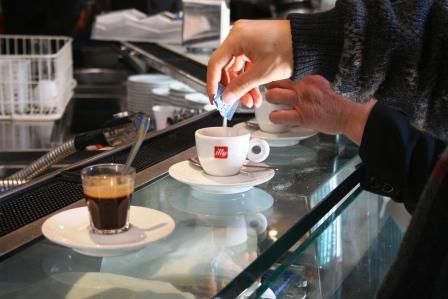
Onward! Along the v. delle Coppelle there is a wonderful little inscription for the Jubliee of 1750. Note the little door. People were to put the names of folks who were ill or needed help so that the Confraternity of Divine Perseverance could help them.
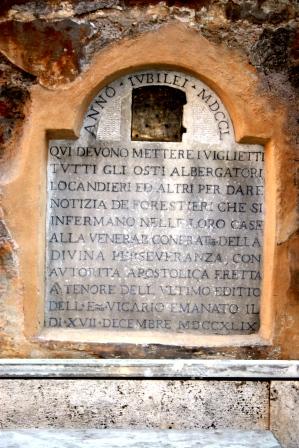
The octogenarian wanted to buy something at the nearby open day market.
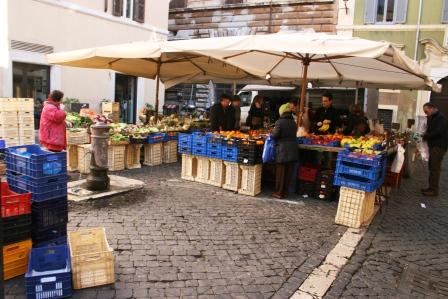
Meanwhile I checked the prices of artichokes… they’re from Puglia (the heal of the boot).
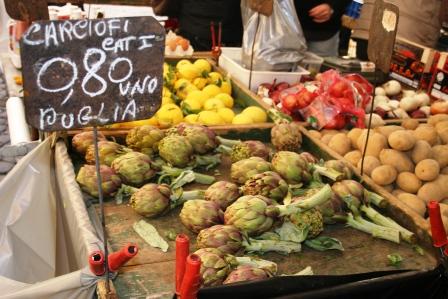
Past the Church of the Camillan Fathers dedicated to St. Mary Magdalen, you can admire St. Camillus of Lellis himself.
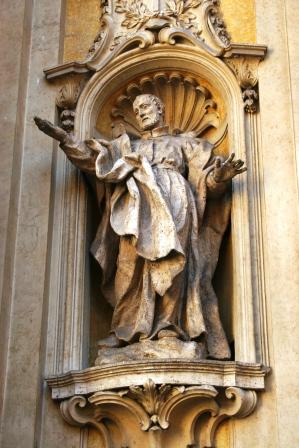
Once this piazza was horribly beset by ugly shacks. Pius VII had them removed in 1823 "by a most provident demolition", as the Latin inscription above the McDonald’s clearly states. Where else but Rome. 1823 was the 23rd and last year of Pius VII’s pontificate. Interesting guy, Pius VII. difficult times.
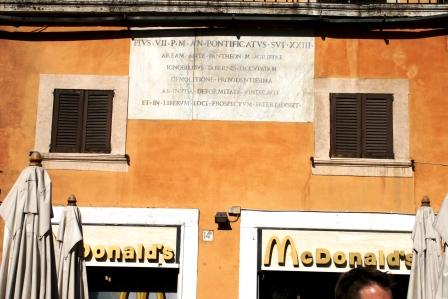
On a slightly more elevated cultural note, facing the piazza is the hotel where Mascagni was the night before his opera Cavaleria Rusticana won its famous prize and were Ariosto, author of Orlando Furioso, lodged in 1513.
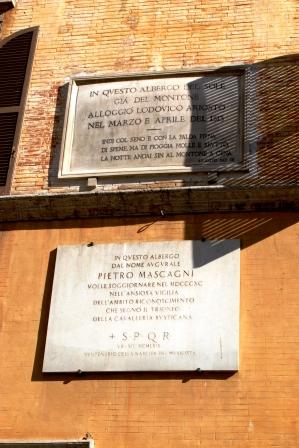
And then there is the Pantheon.
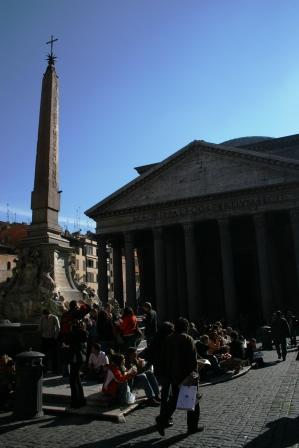
And home again.


































A Latin inscription above a McDonald’s taberna? That’s almost perverse. And in some tragic way it is a reflection of our age. This modern society, so proud of its accomplishments, will pass some day into oblivion and it will not leave behind any memorable monuments. There was a time when language meant something, but these days it has been reduced mostly to repetitious sound-bites. Hans who? Friedrich, Immanuel, Hans, Karl who? Please! “Succus insulsus”. I’d rather read Horatius: at least the latter knows what he’s talking about. That’s the beauty of Latin: that it chisels your thoughts out like a statue from a piece of marble: it doesn’t let you repeat mindlessly what others have said: it forces you to make clear statements (at the danger of exposing your own insipience).
No, that’s just Rome. I really like these photo jaunts, Fr. Z. They remind me fondly of my visits to Rome. I especially liked the picture you posted not long ago of the walk along the river near the synogogue…..very pretty.
I have to ask… what’s the attraction of having one’s coffee ‘in vetro’ (in vitro…)?
Andrew: Oh don’t be such a …. serious person. There is something perfectly right about having a Latin inscription over a Roman McDonald’s. Rome was ever so!
Zadok: Obviously you still have a lot to learn about Rome. First, you say “al vetro” in Rome. Whaddya think this is, “fecondazione assistita”? Also, glass is usually cleaner (a plus in my book). Lastly, it changes the flavor!
o{];¬)
PS: You owe me lunch!
Fr. Z: was the Confraternity of Divine Perseverance a real sodality? I’d really like to think so, and does it still exist? If is does, I want to join! Perseverance suffused with Patience are two of the qualities most needed right now, as always.
Also, I am highly amused by the memorial to Mascagni’s overnight stay, prior to the success of Cavalleria Rusticana. True, the advent of the Verismo school of operatic composition was a momentous occaision, but it’s still delightful overkill. There’s a persistant rumour, if you haven’t heard it already, that Ponchielli – who was Mascagni’s composition teacher at the Academy – actually wrote Cavalleria Rusticana, and gave it to his pupil in order to help start his career. It sort of makes sense too, when you stop and review Mascagni’s subsequent operatic compositions, as none of the are even remotely similar in tone, technique, style or success. Not that that degrades the value of Cavalleria at all, it’s still justly famous; nor does it mean that Mascagni couldn’t write an opera, he certainly could.
Perhaps the truth lies somewhere in between, in that Mascagni may have come up with the (comparatively) naive skeleton of an idea, and Ponchielli helped him flesh it out, re-writing certain sections by way of illustration, as Rimsky-Korsakov did to Mussorgsky’s “Boris Goudonov” to its dramatic and orchestral improvement, albeit post-mortem. So you can think about all this the next time you pass that footnote to operatic history, and formulate your own opinion! The sheer joy of speculative opinionating is but one of the ways Grand Opera and Church Politics coincide.
John Polhamus: Did I post photos?
The post prandial stroll with coffee was usually a matter for the vexed conscience. If stroll and coffee, no riposo. And I needed a 15 minute riposo to sleep off vino from pranzo.
Then a miracle happened. A priest leaving Rome gave me his cappucino machine, so I made my own following riposo.
Or following riposo, stumbled to Tazza d’Oro (near the above) for a granita di café
I was in Rome four about four days in the summer of 2005 before heading on to Cologne, Germany for World Youth Day. I was somewhat amused by the McDonald’s across from the Pantheon. It seems a rather interesting contrast.